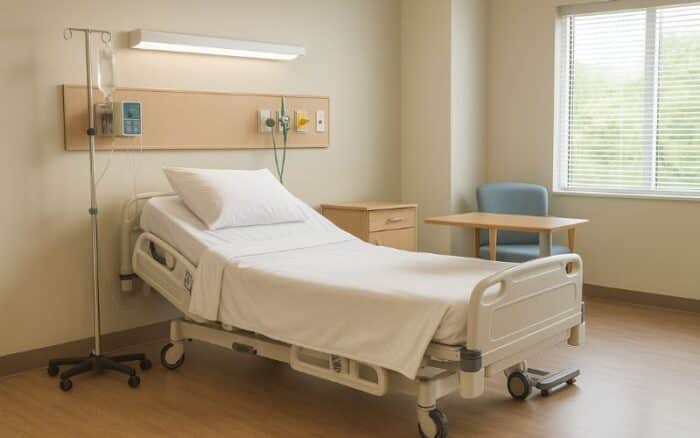Hospitals are confusing and stressful places. When your loved one is in the hospital, these tips from experienced insiders can help you avoid problems and make informed decisions.

Must-know Tips When Seniors are in the Hospital
We found a helpful article from Reader’s Digest with 50 secrets about hospitals that patients should know. They gathered these hospital tips straight from healthcare and medical insiders.
We had a concern about one tip (and we’ll explain why), but the rest are worth taking to heart.
We’ve chosen the 18 tips that are the most helpful for caregivers. We also explain why the advice helps seniors receive the best care.
Be careful with tip #1- Pick a Teaching Hospital
The first tip in the Reader’s Digest list is to choose a teaching hospital because they’re often at the forefront of research.
That’s a helpful benefit, but if you have a chance to plan, you may want to avoid scheduling it in July. That’s when death rates in teaching hospitals spike up to 34% above normal. Whoa!
18 Top Insider Hospital Tips for Seniors and Caregivers
Beware of Freestanding ERs
These are not the same as hospital ERs and probably won’t be equipped to handle the complex health conditions that most seniors have.
Shop Around For Skilled Rehabilitation
Not all skilled nursing and rehab facilities are equal. Call around and ask about their experience with your loved one's specific condition. More experience usually means a better recovery.
Sanitize Everything
Hospitals are where all the germs live! Don’t count on the hospital to have sanitized absolutely every surface.
Seniors are vulnerable to infections, so it is helpful to use bleach or alcohol wipes on bedrails, chair handles, bathroom grab bars, and other frequently touched surfaces. Clean their hands before eating.
Join the Conversation
Ask nurses to do their end-of-shift handover at your loved one's bedside. That way, you can listen in and correct misunderstandings or wrong info before it causes a problem.
Don't Be a Distraction
Feel free to ask questions and chat with nurses, but make sure you’re not a distraction while they’re doing something important, like preparing your loved one's medication.
Talking with you at the same time could lead to a mistake.
Ask What Your Doctor Will Be Doing
Don’t assume your loved one's surgeon will be doing the entire operation and follow-up care.
Sometimes they hand over some duties to other doctors who may not be as experienced or careful. It’s important to determine which parts of the surgery they’ll be doing themselves.
Doctors Are Incentivized to Overtreat
More surgeries = more money. That could cause some surgeons to recommend operations for your loved one that might not be necessary.
Before making a decision, consider the potential consequences of not undergoing the procedure.
Ask If You'll Be Admitted
Always ask if your loved one will be admitted or if they’ll be under observation. This is critical because Medicare won’t pay for post-hospitalization services, such as rehabilitation or home health, unless the person has been admitted for at least three consecutive overnight stays.
Check, Check, Check Your Bill
Eight out of 10 hospital bills contain an error! Verify that all medications and services billed were actually provided to your loved one. Plus, you might even be able to negotiate a 35 – 50% discount.
Second-Guess Tests
Medical tests are often done as a “just in case,” but can be invasive and cause older adults unnecessary suffering.
Ask doctors why they want to order that test, what information it will give, and how it will change your loved one's care.
Be Detailed About Your Meds
Nurses may say, “It’s ok, we’ve got all the medication info in the computer,” but mistakes happen far too often.
Bring a printed list of your loved one's medications. A clear medication schedule with full drug names, time of day, dosage, and special instructions goes a long way to preventing problems.
Admitted? Log Everything
Keep a notebook with you and track everything, like an ongoing journal of events.
Record time, date, and names when people come and go, services or tests are done, doctors talk with you etc.
A lot of info is constantly being thrown at you, and this helps you keep the facts straight. This log also helps resolve billing issues in the future.
Stay With Your Loved Ones
It’s exhausting, but do your best to stay the night with your loved one. You’ll be able to keep them from getting disoriented in the middle of the night and help get the assistance they need.
This is especially important if they are unable to press the call button themselves. Nurses may only come when called.
Hospital Food Could Make You Sick
Don’t assume hospital meals will be safe for your loved one.
For example, certain medications used to treat high blood pressure or heart failure can increase potassium levels. A breakfast with bananas and orange juice, both high in potassium, can cause a big problem.
Ask the doctor if there are foods to avoid, and watch out for them on the meal tray.
Schedule Surgery Early In the Week
Hospitals have more staff and more experienced doctors and nurses available during the week.
Try to schedule surgery early in the week so your loved one will be well on the way to recovery by the weekend. During weekends and holidays, there is less staff, and some services may be closed.
Take Notes, Especially at Discharge
With all the stress and exhaustion, it’s natural to forget half of what doctors or nurses tell you. That information is important, so write everything down in a notebook. You’ll thank yourself later.
Get Your Papers Right Away
Get copies of all labs, tests, scans, surgery reports, and the discharge summary before leaving the hospital.
It can be incredibly difficult to get copies after leaving. Avoid this headache and get a copy even if they say everything is “in the system” and can be sent anywhere. That’s not always true.
Schedule Your Follow-Up Before You Leave
Before leaving the hospital, insist that your loved one's follow-up appointment is scheduled.
The hospital may be able to assist with making arrangements with the doctor who is taking over. This avoids potential problems that can arise from not receiving proper follow-up care within the right timeframe.
Recommended for you:
- Medicare Coverage for Hospital Stays: Inpatient vs Outpatient Status
- Caregiver Essentials for Sudden Hospital Trips: Be Prepared
- This Hospital Discharge Checklist Prepares Seniors for Successful Recovery
About the Author

Connie Chow
Connie was a hands-on caregiver for her grandmother for 20 years. (Grandma made it to 101 years old!) She knows how challenging, overwhelming, and all-consuming caring for an older adult can be. She also knows how important support is — especially in the form of practical solutions, valuable resources, and self-care tips.




